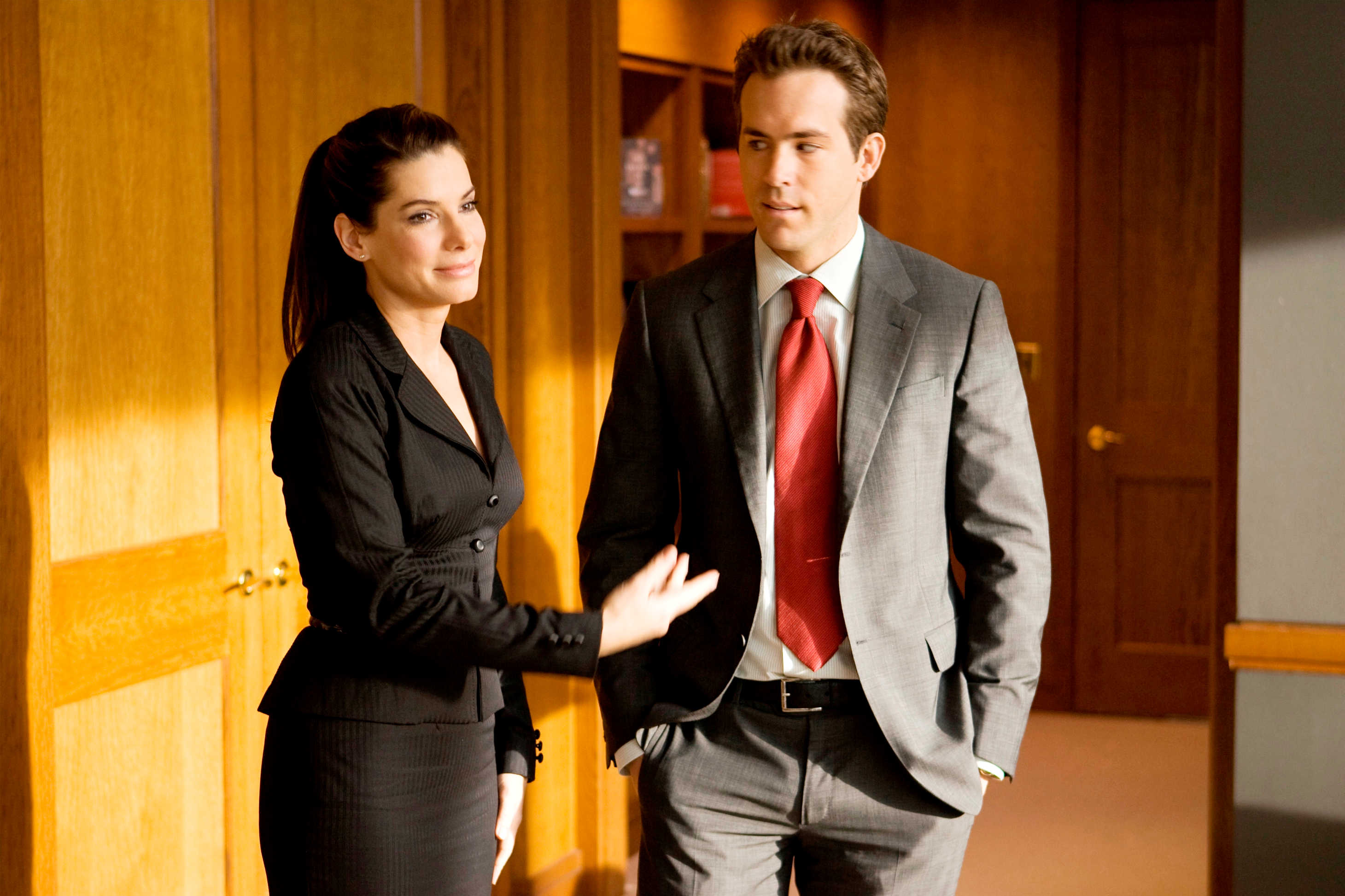

Director: Anne Fletcher, 2009.
Take a driven and pushy workaholic book editor. Add in a pretty executive assistant 12-years younger (at least in real-life). Make the successful editor a Canadian whose visa expired and is about to be deported. Solution: marry the young American and voila life's a peach. That's the storyline of The Proposal. Except Fletcher throws in a giant role reversal and makes the editor a woman, Margaret Tate (Sandra Bullock), and her assitant is Andrew Paxton (Ryan Reynolds, Definitely Maybe).
Fletcher uses a female central figure as she did in her earlier film, 27 Dresses. Right from the start we see Margaret as a witch. Even her co-workers refer to her as such in the instant messaging system they have perfected to keep each safe from her tantrums and her spells. She is completely focused on her work and her career, not caring about colleagues below her. She has no family and no friends.
 Andrew, on the other hand, is a sycophant, sucking up to his boss as a way to advance. His dream is to be an editor like her, and he sees her as his meal ticket. He will do anything, sacrifice time with his family, to make progress in this ambition. Where Margaret is a witch, Andrew is a wimp. But when she tells her bosses that she is marrying him, that is close to the limit. He is ready to opt out of this one until Margaret tells him he will lose his job the minute she is deported and all his efforts will have been in vain. Not surprisingly he agrees.
Andrew, on the other hand, is a sycophant, sucking up to his boss as a way to advance. His dream is to be an editor like her, and he sees her as his meal ticket. He will do anything, sacrifice time with his family, to make progress in this ambition. Where Margaret is a witch, Andrew is a wimp. But when she tells her bosses that she is marrying him, that is close to the limit. He is ready to opt out of this one until Margaret tells him he will lose his job the minute she is deported and all his efforts will have been in vain. Not surprisingly he agrees.When they go to file at the INS office, things get more complicated. The immigration officer smells a rat. He tells them they have 4 days before they must come back for a detailed interview together. In that time self-obsessed Margaret must learn everything about Andrew, who already knows more than he ought about her.
As a naturalized American, I have gone through this interview with my American bride. It is every bit as intimidating as The Proposal suggests it will be. I remember when the interviewing officer asked a question of my wife and I started to answer for her whereupon he abruptly silenced me. It was her answer he wanted to hear. Did she really know me? Or was my marriage a sham to get me into the country? Well, mine was for real, and we are at 20+ years and counting, unlike Margaret's proposal.
Margaret accompanies Andrew on a visit to his parents home to celebrate his grandmother's 90th birthday. Arriving in Sitka, Alaska, she is in high heels and a New York City dress. His family are in flats and pants. This is quite the contrast. Alaska is about as far apart from New York as you can get. Margaret is obviously a fish-out-of-water.
The Proposal illustrates some negative ethics. Margaret does not seem to see the depth of the immorality that she is diving into. She is completely career and money focused. But "the love of money is a root of all kinds of evil" (1 Tom. 6:10), and she coerces Andrew into agreeing to marry her. This coercion has two sides to it. The upside is the bribe, the promise of career improvement. The downside is the threat of job loss. But what starts with a simple lie, becomes an act of fraud before the US official. The lie births a felony.
How true it is that a simple lie can beget a monster. Sin heaps upon sin until we forget what the truth is. The Bible warns us against acts of deception, but too often we rationalize the first lie as necessary. Once that is done, the snowball has started rolling downhill and we struggle simply to keep up. And it is an act we have to keep up, all the while remembering the earlier lies. Jesus has it right: "Let your yes be yes" (Matt. 5:37).
 But The Proposal also highlights some positive values. Fletcher surrounds Andrew with family and friends who love him and miss him. This family is not perfect but it is his family. Grace (Mary Steenburgen) is a mother who wants the best for her boy. Joe (Craig T. Nelson) is a father who thinks he knows what is best for his boy but does not really know Andrew. There is a rift in their relationship that no quick father-son talk can heal. And there is Grandma Annie (Betty White). Betty White gets the funniest lines and is terrific as the all-wise grandma who knows more than she lets on. The only weird thing is her mother earth worship, a take on Native American religion, that appears totally unnecessary except to let Bullock shake her booty.
But The Proposal also highlights some positive values. Fletcher surrounds Andrew with family and friends who love him and miss him. This family is not perfect but it is his family. Grace (Mary Steenburgen) is a mother who wants the best for her boy. Joe (Craig T. Nelson) is a father who thinks he knows what is best for his boy but does not really know Andrew. There is a rift in their relationship that no quick father-son talk can heal. And there is Grandma Annie (Betty White). Betty White gets the funniest lines and is terrific as the all-wise grandma who knows more than she lets on. The only weird thing is her mother earth worship, a take on Native American religion, that appears totally unnecessary except to let Bullock shake her booty. Four days with the almost-all-American, certainly all-Alaskan, Paxtons, is more than Margaret wants or thinks she can handle. But over this time, dealing with dial-up connections and flying dogs, her cynical shell cracks. And lo and behold we see a real person trying to get out. She sees a real family, warts and all. There is even a trip to the woodshed for a verbal spanking. And just as Margaret's character softens, so too does Andrew's. He becomes stronger, more determined, and willing to risk loss for what he really wants.
Four days with the almost-all-American, certainly all-Alaskan, Paxtons, is more than Margaret wants or thinks she can handle. But over this time, dealing with dial-up connections and flying dogs, her cynical shell cracks. And lo and behold we see a real person trying to get out. She sees a real family, warts and all. There is even a trip to the woodshed for a verbal spanking. And just as Margaret's character softens, so too does Andrew's. He becomes stronger, more determined, and willing to risk loss for what he really wants.The Proposal leaves us reflecting on the value of family. Most of us had a family growing up. Probably none was perfect. We may carry baggage with us into adult life, but there is a strong and wholesome value in the family unit. God designed family to procreate from the very beginning. Parents are there to raise their children in a loving fashion. When we see family working, even if imperfectly, we see the goodness of God. And it is the grace of God that allows selfish individuals to come together to bond as a unit. We can walk away from this and forget what it means. But one look at a real family built on love and the memories return. We can, we must, enjoy whatever family we have alive on this earth. And, for followers of Jesus, we can look ahead to that ideal family that awaits us with our heavenly Father in the life to come.
Copyright ©2009, Martin Baggs

No comments:
Post a Comment